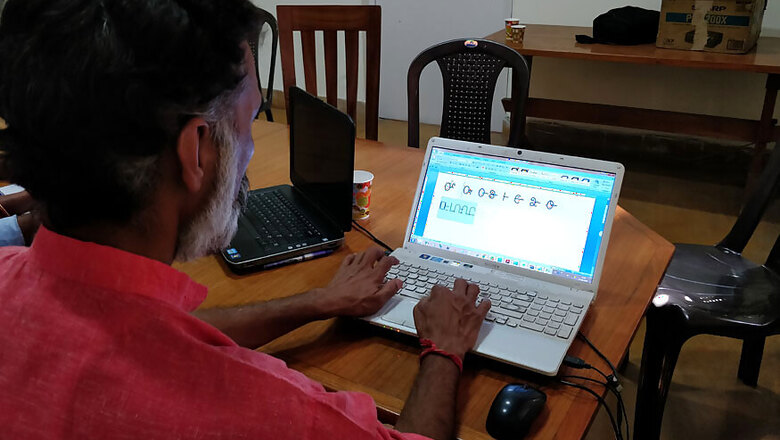
views
New Delhi: The Ministry of Culture has extended support to the people’s initiative from the forests of central India to reclaim the identity of their mother tongue Gondi, which is spoken by almost a crore of Gond people, hailing from Madhya Pradesh, Gujarat, Telangana, Maharashtra, Chhattisgarh and Andhra Pradesh.
The language has over a period of time acquired many regional influences and has variations as we traverse from one part of the tribal belt to another. The original language of the Gondi people has been fading because of the influences of regional languages on it.
The effort is synchronised to reclaim the past glory and identity of the language. It was organised by the IGNCA and CGNet Swara, Indian voice-based online portalS that allow people in the forests of tribal India to report local news. They came together to bring out the "standard dictionary of Gondi language." This dictionary has 3,500 original Gondi words.The aim is to create a typeface for the language and an app as well in the future.
The people from the tribal belt have come together to find consensus over the accepted words – whether 'Raasta' should be standardised as 'Sarri', as spoken in MP or Chhattisgarh.
The initiative that started in 2014 is supported by the Culture Ministry and is in line with the Rashtriya Swayamsevak Sangh’s resolution, which was passed at Sangh’s annual meeting in Nagpur - the Akhil Bharatiya Pratinidhi Sabha (ABPS).
The resolution said that primary education in the country should be in mother tongue or in any of the Indian dialects, including teaching technical and medical in higher education.
Conflict Resolution
There are many reasons for the tribal people to come together to solve the language problem. One of them is communication. The first workshop began in 2014. At the time, even the Gondi people failed to understand the Gondi language of another region. Over a period of time, they have started learning the variations brought in by regional influences.
“One can imagine how difficult it must be to communicate with people speaking other regional languages. One of the reasons for conflict in these areas is lack of communication," said Shubhranshu Choudhary from CGNet Swara, the organiser of the event. He has been a journalist and belongs to the tribal area.
The representatives of the government don’t understand their language, which he believes creates a gap and condition for conflict.
As there is work on the ground to bring out a dictionary of 3,500 Gondi words, the initiative comprises representatives from different states who speak different forms or variations of Gondi (Oriya) Gondi (Telugu) Gondi (Marathi) etc. In the workshop the people have come together to form consensus over standardisation of the language.
“We are finding the real Gondi, filtering it from the external and non-Dravidian and other regional influences. We want to come out with our original identity, so that we can carry forward the values and history of Gondi,” said Professor KM Metry, Department of Tribal studies Kannada University, Hampi.
Controlling drop-out rate in schools
Heerasan Uikey, a lecturer in senior secondary school in Balaghat district, told News18.com, "In Balaghat district, 300 government schools came up with three teachers who did not know Gondi. There was no communication between the students and teachers as they didn’t know Gondi language, and children dropped out of the school," she said.
The textbooks of different parts of Bastar also have variants of Gondi, there is no uniformity. "One of the reasons of having standardisation of the language is also to control the dropout rate in schools," Metry added.
In other tribal areas of Madhya Pradesh, 24 new schools came up, none of which exists today because of the lack of communication between children and teachers. There is imposition of Hindi languages in schools. "Because of the language issue in schools, children who know Gondi, dislike going to schools," said Gulzar Singh Markai who belongs to the Gondi-speaking tribal belt.
'Why were we ignored?'
There is fear among the people who speak Gondi language that it will face extinction if concerted efforts are not made.
Gulzar Singh Markai said, "Let us go back in history when the reorganisation of states was taking place. Why were we Gondi-speaking people ignored? When there could be Andhra Pradesh for Telegu-speaking people, Odisha for Oriya -speaking people then why were we, the people of Gondwana region of India ignored?"
He added that though it is ambiguous, the core region can be the eastern part of the Vidarbha region of Maharashtra, the parts of Madhya Pradesh immediately to the north of it, and parts of west Chhattisgarh. It can also include parts of northern Telangana, western Odisha and southern Uttar Pradesh.
The tribal people said that there is a long-pending demand to include Gondi in the Eighth Schedule of Indian languages.




















Comments
0 comment